

What is social isolation? Facts about Senior Isolation. Nearly one-third of all seniors live by themselves, according to the U.S.
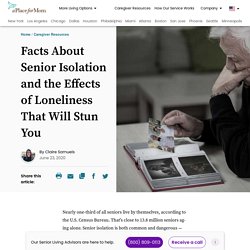
Census Bureau. That’s close to 13.8 million seniors aging alone. Social isolation, loneliness in older people pose health risks. Human beings are social creatures.
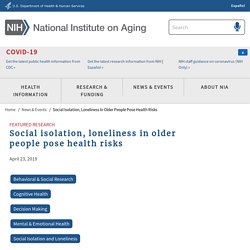
Our connection to others enables us to survive and thrive. Yet, as we age, many of us are alone more often than when we were younger, leaving us vulnerable to social isolation and loneliness—and related health problems such as cognitive decline, depression, and heart disease. Fortunately, there are ways to counteract these negative effects. Stages of Development. Stage 8: Integrity vs. Despair. Integrity vs. Despair in Psychosocial Development. Integrity versus despair is the eighth and final stage of Erik Erikson’s stage theory of psychosocial development.
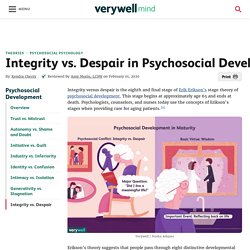
This stage begins at approximately age 65 and ends at death. Psychologists, counselors, and nurses today use the concepts of Erikson's stages when providing care for aging patients.1 Erikson’s theory suggests that people pass through eight distinctive developmental stages as they grow and change through life. While many developmental theories tend to focus purely on childhood events, Erikson was one of the few theorists to look at development across the entire course of the lifespan. He was also one of the first to view the aging process itself as part of human development. At each stage of psychosocial development, people are faced with a crisis that acts as a turning point in development. Overview Psychosocial Conflict: Integrity versus despairMajor Question: "Did I live a meaningful life? " Integrity vs. An Example of the Integrity vs.
Physical Inactivity. Memory Changes in Late Adulthood. Living Alone. Loss of Loved Ones. How Social Isolation Affects the Brain. Daisy Fancourt was at her home in Surrey in southeast England when the UK government formally announced a nationwide lockdown.
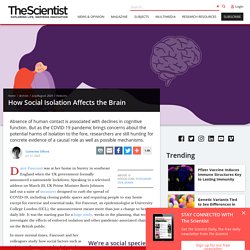
Speaking in a televised address on March 23, UK Prime Minister Boris Johnson laid out a suite of measures designed to curb the spread of COVID-19, including closing public spaces and requiring people to stay home except for exercise and essential tasks. For Fancourt, an epidemiologist at University College London (UCL), the announcement meant more than just a change to her daily life. It was the starting gun for a huge study, weeks in the planning, that would investigate the effects of enforced isolation and other pandemic-associated changes on the British public.
We’re a social species. We really need others to survive. In more normal times, Fancourt and her colleagues study how social factors such as isolation influence mental and physical health. . © istock.com, Maria Zamchy. The loneliness of social isolation can affect your brain and raise dementia risk in older adults. Physical pain is unpleasant, yet it’s vital for survival because it’s a warning that your body is in danger.
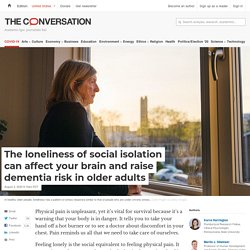
It tells you to take your hand off a hot burner or to see a doctor about discomfort in your chest. Pain reminds us all that we need to take care of ourselves. Feeling lonely is the social equivalent to feeling physical pain. It even triggers the same pathways in the brain that are involved in processing emotional responses to physical pain. Social isolation, loneliness in older people pose health risks. Fighting loneliness among elderly during COVID-19 lockdowns. Social isolation and loneliness among older adults in the context of COVID-19: a global challenge. The impact of the COVID-19 pandemic on older persons Older Adults in 11 High Income Countries Who Feel Socially Isolated. Singapore’s social recession: Are the elderly the hardest hit? Singapore is a city state that prides itself for its multitudes of successes; its economy, education system – and even the ageing process.
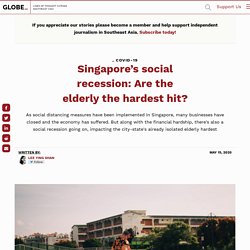
Older adults felt socially isolated, less satisfied during COVID-19 circuit breaker: Survey. Elderly suicide cases in Singapore shows a growing concern on mental health. 21 Fun Activities for the Elderly in Singapore. At Home 5.
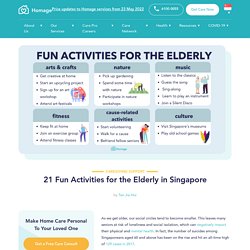
Play old school games Go back in time as you and your loved ones engage in a nostalgic game of 5 stones, pick up sticks, as well as traditional games like the Chinese Chess and Congkak available here. For a local twist, check out games from Hua Hee and KYDZ. Many of these brain-stimulating games can also be found on popular gaming consoles. SilverActivities has also created SilverPad, a senior-friendly tablet where the elderly can independently watch shows, play music, and stay engaged with their custom-built cognitive games.
Active ageing programmes. Active ageing programmes (AAPs) encourage seniors to stay active, healthy and socially engaged. Seniors can join these programmes that are located in their neighbourhood. Sweat it out in group exercise sessions Learn a range of different exercises, including Zumba Gold, Kpop fitness, stretch band exercises and low impact aerobics. Creative Dementia Activity - Using Tupperware. How to Combat Loneliness and Isolation as We Age. Seated Exercises for Older Adults. Care for a Senior. The People’s Association (PA) will leverage its community facilities and network to deliver health services and promote health education, senior learning and volunteerism under the Wellness Programme, so that we can eventually have a wellness hub in every mature neighbourhood.Under the Community Networks for Seniors (CNS) programme, regular "Wellness Time" will be introduced at community facilities islandwide to encourage seniors to keep active, healthy and socially engaged.
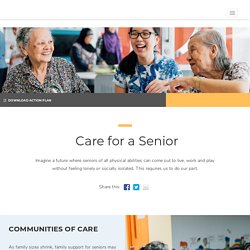
"Wellness Time" comprises a suite of regular active ageing and preventive health programmes for seniors. These include health screening, exercise classes, health talks and social activities. Summary. Caregivers' Survival Guide: How to Care for an Elderly.
Tips for Caregivers of the Elderly. What's Funny about Caregiver Fatigue? 9 Coping Strategies for Caregivers of Seniors - My Mental Health. Supporting Seniors & Elderly 9 Coping Strategies for Caregivers of Seniors 1 July 2020 | 8 min read Caregiving can be both rewarding and challenging.
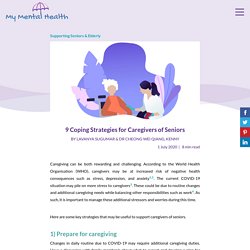
According to the World Health Organisation (WHO), caregivers may be at increased risk of negative health consequences such as stress, depression, and anxiety1,2. The current COVID-19 situation may pile on more stress to caregivers3. Ways to take care of yourself. Caregiver Support Groups in Singapore. Caregivers-to-Caregivers Training Programme (C2C)
While caring for others, it is important to care for the self too. References.